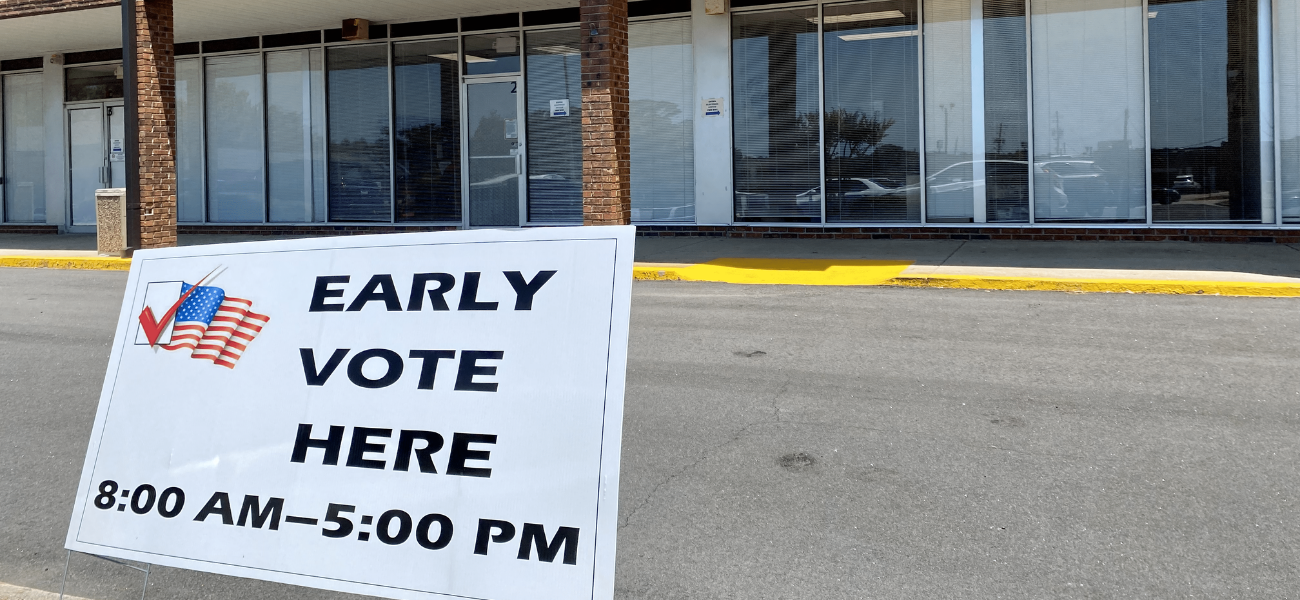Stay ahead of the curve as a political insider with deep policy analysis, daily briefings and policy-shaping tools.
Request a Demo
Credit: Beau Evans (State Affairs)
- Early voting has drawn triple the turnout so far in the 2022 primaries compared to Georgia’s last governor’s race in 2018.
- Republican ballots have greatly outnumbered Democratic ballots cast in the early-voting phase.
- Election experts are eyeing whether the vote-by-mail changes could dampen Democratic turnout.
The Gist
Early voting is off to a hot start in Georgia for the 2022 election cycle, tallying more than 254,000 votes about halfway into the three-week voting period ahead of the May 24 primaries.
What’s Happening
Stiff competition in primary races for Georgia governor, secretary of state, lieutenant governor and other statewide offices have spurred thousands more voters to cast early ballots at this point in the early-voting process, compared to major primary elections in recent years.
Early voting so far has drawn more than triple the turnout compared to this point in the 2018 primaries, when Georgia last held a gubernatorial election. Gov. Brian Kemp, a Republican, edged out Democratic contender Stacey Abrams in a close race that year.

Request an absentee ballot to vote by mail in the 2022 primary by using the the state’s online portal at https://securemyabsenteeballot.sos.ga.gov/s/. (Credit: Brittney Phan for State Affairs)
Republican ballots have greatly outnumbered Democratic ballots cast so far in the early-voting phase, with more than 146,000 Republican ballots tallied compared to around 106,000 Democratic ballots as of Wednesday morning, according to state elections data.
The gap is likely due to higher-profile contests on the Republican side of the primary ballot, particularly in the races between Kemp and former U.S. Sen. David Perdue for governor, and between current Secretary of State Brad Raffensperger and opponent U.S. Rep. Jody Hice, said Charles Bullock, a University of Georgia (UGA) political science professor.
“Early votes are way up this year versus what they were four years ago,” Bullock said. “One thing that gets people to vote is if there’s a contest.”
Why It Matters
Georgia has become a battleground state amid changing voter demographics over the last decade and Democratic gains in the 2020 elections that have loosened Republican officials’ grip on top political offices.
Races up and down the ballot are expected to be close this year. Major elections in Georgia for governor, secretary of state, U.S. Senate and president have been decided by razor-thin margins since 2018:

This year’s early-voting period features the first major test of changes to Georgia’s election system following controversy over unfounded claims of voter fraud in the 2020 contests.
In particular, the Republican-controlled General Assembly overhauled key rules for voting by mail after more than 1 million people cast absentee ballots in 2020. Those changes include shortening how long voters can request mail-in ballots and adding new requirements for voters to verify their identities.
Election experts are eyeing whether the absentee changes could dampen turnout among Democratic voters, who cast roughly one-third of their ballots by mail in the 2020 general election amid concerns over Covid-19.
Andrea Young, the executive director for the ACLU’s Georgia chapter, said she doesn’t plan to vote by mail this year after doing so in 2020, due to the timing and ID-verification changes.
“I won’t be voting absentee this year because I don’t trust myself to meet all the deadlines,” Young said. “And I’m a lawyer.”
Shifting Trends
The current surge in Republican early votes is “a bit of a reversal,” said UGA’s Bullock, who noted Democratic voters have historically dominated early voting, while Republican voters usually cast more absentee ballots.
“It used to be that Democrats were the ones that were more likely to flock to the polls early on,” Bullock said. “Now there’s more highly visible activity over at the Republican side.”
It’s tough to read the tea leaves on whether lower early-voting turnout for Democratic candidates in the primaries could spell trouble for them in the November 8 general election, said Trey Hood, also a UGA political science professor.
What’s clearer is Georgia’s pivot back to more pre-pandemic voting patterns, in which early in-person voting made a bigger impact on an election’s outcome than absentee ballots, Hood said.
“I think most people will go back to voting early in person or on election day,” Hood said. “But I also think people often read too much into early voting.”

This graphic shows where candidates stand on top issues in the race for Georgia’s secretary of state in the 2022 elections. (Credit: Brittney Phan for State Affairs)
Some observers are also watching whether Democratic voters cast ballots in Republican primaries to sway outcomes in those contests, given Georgia is one of 15 open-primary states allowing voters to cast ballots regardless of their party affiliation.
Jeanne Dufort, a Morgan County resident, said she knows several Democratic friends who have voted early in the Republican primary – mostly due to the secretary of state’s race, in which Hice has pledged to overturn the 2020 results if he unseats the incumbent, Raffensperger.
“I am 100 percent positive it’s happening,” Dufort said. “I’m just not positive about the scale of which it’s happening.”
But don’t expect Democratic voters posing as Republicans to sway any of Georgia’s primaries. Cross-party voting is rare and is typically never enough to tip an election one way or another, said Andra Gillespie, an Emory University political science professor.
“It doesn’t happen that often because it’s a really sophisticated move that most voters wouldn’t think about doing,” Gillespie said. “The ones that do it are your political junkies that follow politics closely in general.”
What’s Next?
Georgia’s primary election will be held on May 24. The general election takes place on November 8, with early voting starting on October 17.
The large number of candidates in many primary races raises chances for runoff elections on June 21. Gillespie expects runoffs in the crowded Democratic races for secretary of state and lieutenant governor, as well as the contested Republican race for secretary of state.
The current early-voting period lasts through May 20 in Georgia including Saturdays in many counties. Some counties will also keep precincts open on Sunday.
Find the days and hours for early-voting locations in your county here.
Join the Conversation
What else do you want to know about elections, voting rights and state government in Georgia? Share your thoughts/tips by emailing [email protected].
Professionals still face licensing delays amid state’s transition to online system
The Gist Georgia’s professionals and business owners are still struggling to obtain professional licenses in a timely manner. As the Secretary of State’s Office rolls out its new Georgia Online Application Licensing System to expedite the process, the efficiency of this new process is being put to the test. What’s Happening Thursday morning at the …
Controversy over AP African American Studies class grows
Rashad Brown has been teaching Advanced Placement African American Studies at Atlanta’s Maynard Jackson High School for three years. He’ll continue to do so — even though the state’s top education official removed it from the list of state-funded course offerings for the upcoming school year. While Brown prepares to start teaching his class on …
Students, teachers, lawmakers blast decision to end AP African American history classes
ATLANTA — A coalition of lawmakers, civil rights leaders, clergy, educators and students Wednesday called on the state’s education czar to rescind his decision to drop an advanced placement African American studies class from the state’s curriculum for the upcoming school year. “This decision is the latest attack in a long-running GOP assault on Georgia’s …
Kamala Harris’ presidential bid reinvigorates Georgia Democrats
Georgia Democrats have gained new momentum heading into the November election, propelled by President Joe Biden’s decision to bow out of his reelection bid and hand the reins to Vice President Kamala Harris. The historic decision, announced Sunday, is expected to prove pivotal in the national and state political arenas and breathe new life and …




